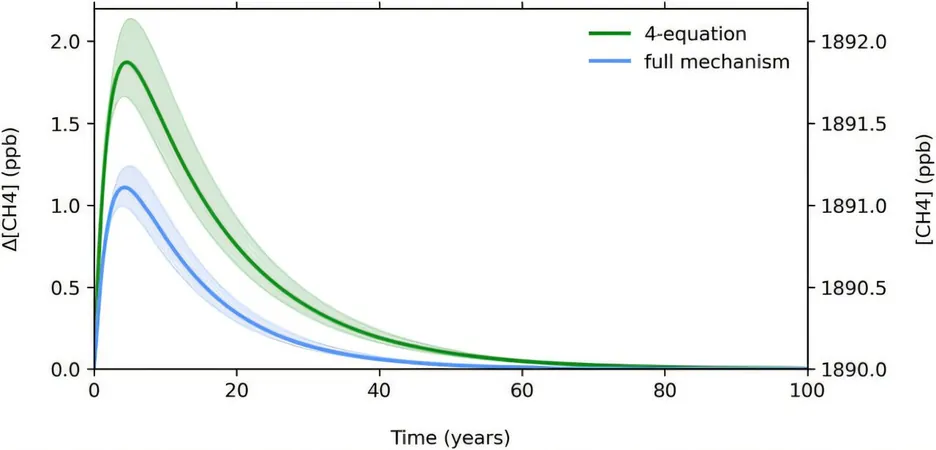
Groundbreaking Climate Chemistry Model Reveals Hidden Risks of Hydrogen Fuel Leakage
2024-12-16
Author: Nur
As the planet grapples with the urgent need to curb climate change, hydrogen has emerged as a promising candidate to replace fossil fuels, notorious for their greenhouse gas emissions when burned. Emitting no greenhouse gases (GHGs) during combustion, hydrogen can potentially power various sectors, from industrial processes to home heating. However, new research highlights that hydrogen, if leaked, poses significant risks to our climate, leading scientists to call for immediate action to prevent such occurrences.
Hydrogen's Dual Role in Climate Chemistry
A team from the Massachusetts Institute of Technology (MIT) has recently published a study revealing that while the direct climate impacts of leaked hydrogen are less severe than previously estimated, they are far from negligible. The researchers employed an advanced modeling technique that analyzes a multitude of chemical reactions affected by hydrogen, leading to crucial insights into the environmental consequences of hydrogen fuel leakage.
The study, published in Frontiers in Energy Research, found that the impact of leaked hydrogen on the climate is about one-third of the current impacts of leaked natural gas. This finding underscores the necessity of implementing robust leak prevention strategies as we establish an infrastructure for hydrogen use.
The Importance of Chemical Feedback Loops
When hydrogen escapes into the atmosphere, it can indirectly contribute to climate change by affecting other compounds, particularly methane, a potent greenhouse gas. According to the researchers, the leaked hydrogen interacts with a crucial atmospheric substance known as the hydroxyl radical (OH), often referred to as the "detergent of the atmosphere." OH plays a vital role in breaking down methane and other pollutants, thereby cleaning our air. However, with hydrogen leakage, the availability of this radical diminishes, potentially leading to an increase in methane concentrations, escalating global warming.
The earlier 2022 modeling that forecasted drastic impacts from hydrogen leakage relied on a simplified framework of just four chemical reactions. In contrast, the MIT team developed a comprehensive 66-reaction model that captures a more intricate set of interactions, revealing that the previous predictions may have overestimated the methane concentration increase due to hydrogen escape.
Comparing Hydrogen and Natural Gas Leakage
One of the critical breakthroughs in the MIT study was the recognition of feedback loops within the chemical reactions. As methane concentrations rise, they can create additional OH radicals, partially offsetting the losses caused by hydrogen leakage. This feedback mechanism was ignored in the earlier four-equation model, leading to an overestimation of methane’s atmospheric increase following a hydrogen leak by around 85%.
Interestingly, the researchers discovered that even though the initial concentration of methane peaks due to the hydrogen leak, with time, the system finds a new equilibrium, resulting in the formation of more OH radicals that can mitigate methane levels.
Practical Implications and Recommendations
When comparing the climate impact of leaked hydrogen versus natural gas, which is primarily composed of methane, the study found that hydrogen poses three times less climate impact on a per-mass basis when leaked. This presents a potentially beneficial shift from natural gas to hydrogen, but it relies heavily on effective management of leaks during the transition process.
The findings emphasize that while hydrogen may be an excellent alternative energy source when utilized properly, significant measures must be taken to prevent leakage to reduce its greenhouse potential. The researchers advocate for a careful approach to hydrogen infrastructure development, suggesting that hydrogen should be viewed as a transitional energy source rather than a long-term solution if leakage cannot be controlled effectively.
The MIT team's ongoing research aims to explore various scenarios involving hydrogen in the energy transition, including comparing the greenhouse effects of different fuels. Their revolutionary model provides a clearer picture of the climate implications of hydrogen use, imperative for policymakers and environmental advocates alike as they strive towards net-zero carbon emissions by 2050.
In conclusion, the priority must now shift to ensuring a leak-free hydrogen future. Addressing leakage will not only enhance the environmental benefits of hydrogen but also play a critical role in the global fight against climate change. Failure to act may render hydrogen a temporary, rather than a sustainable, solution in our quest for clean energy.


 Brasil (PT)
Brasil (PT)
 Canada (EN)
Canada (EN)
 Chile (ES)
Chile (ES)
 España (ES)
España (ES)
 France (FR)
France (FR)
 Hong Kong (EN)
Hong Kong (EN)
 Italia (IT)
Italia (IT)
 日本 (JA)
日本 (JA)
 Magyarország (HU)
Magyarország (HU)
 Norge (NO)
Norge (NO)
 Polska (PL)
Polska (PL)
 Schweiz (DE)
Schweiz (DE)
 Singapore (EN)
Singapore (EN)
 Sverige (SV)
Sverige (SV)
 Suomi (FI)
Suomi (FI)
 Türkiye (TR)
Türkiye (TR)